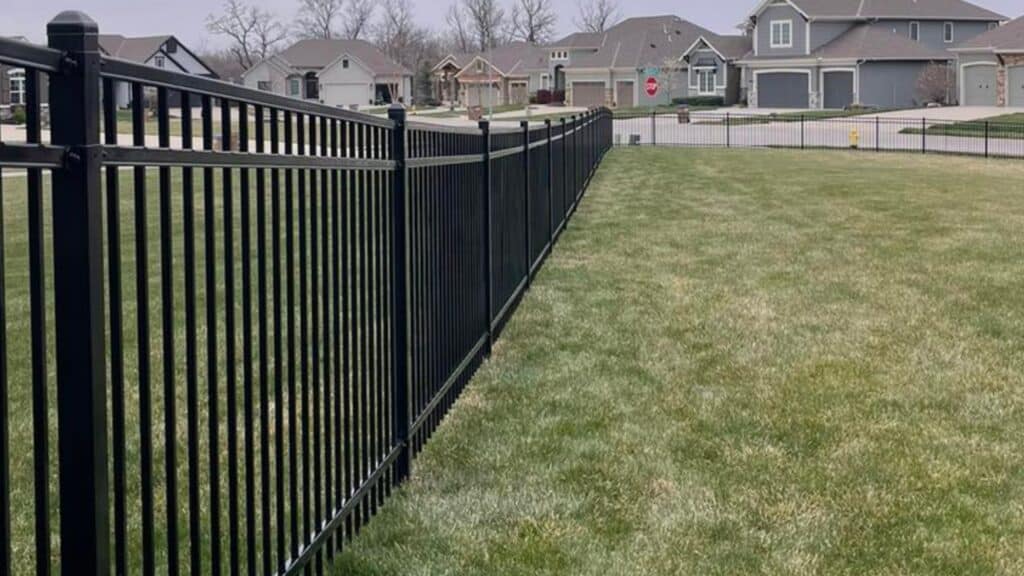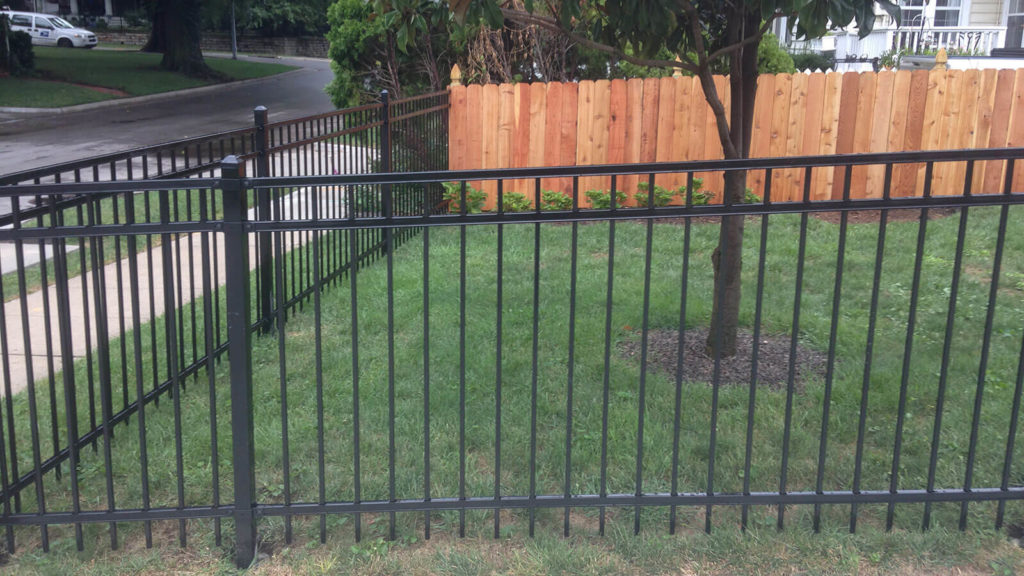
Understanding Aluminum vs. Steel Fencing: Which is the Best Choice?
Comparing Two Popular Fence Materials
Before choosing between aluminum and steel fencing, it’s important to understand how these two materials differ in strength, maintenance, cost, and appearance. Each offers unique advantages depending on your property’s needs.
At a fundamental level, the choice between aluminum and steel is a choice between a lightweight, rust-proof material and a heavy-duty, exceptionally strong material.
The Fundamental Materials: Lightweight vs. Heavy-Duty
- Aluminum Fencing: Made from a lightweight, non-ferrous metal. Aluminum fences are valued for their rust resistance, low weight, and cost-effective installation. It’s a popular choice for decorative and residential fencing.
- Steel Fencing: Made from an iron alloy. Steel is significantly heavier and stronger than aluminum, making it ideal for high-security applications where maximum strength and durability are needed. It requires a protective coating to resist rust.
Common Applications of Each Fence Type
- Aluminum: Most often used for pool enclosures, residential yards, and decorative fences where a balance of classic aesthetics and minimal maintenance is desired.
- Steel: The preferred choice for commercial properties, industrial sites, and any area where security, rigidity, and resistance to significant impact are the top priorities.
Cost and Value: Which is a Better Investment?
The financial aspect is a major factor, both in terms of initial cost and long-term value.
Aluminum vs. Steel Fence Cost
In most cases, steel fencing is more expensive than aluminum fencing. The initial material cost for steel is higher due to its density, and the labor cost for installation is significantly greater due to its heavy weight. Aluminum’s lightweight nature makes it easier to transport and install, which translates to a lower overall price.
Long-Term Value and Lifespan
Both materials are excellent long-term investments with a long lifespan. A high-quality aluminum fence can last for 50 years or more with very little maintenance, and a properly coated steel fence can also last for decades. While steel has a higher initial cost, its unparalleled strength can be a valuable investment for security-focused applications.
Durability, Strength, and Maintenance
Beyond cost, the physical properties of the materials are key to understanding their performance.
Do Aluminum Fences Bend More Easily Than Steel?
Yes, aluminum fences will bend or dent more easily than steel fences. Steel is a much more rigid and dense metal, making it far more resistant to impact. A strong force that might dent or bend an aluminum rail would likely not affect a steel one. For this reason, steel is the superior choice for high-security areas or properties that may experience significant impact.
Maintenance and Corrosion Resistance
- Aluminum: Naturally rust-proof. Its protective powder-coated finish will not rust if it is scratched or chipped, making it an incredibly low-maintenance material.
- Steel: Susceptible to rust. To prevent rust, steel fences are always coated with a protective layer, such as galvanization or powder-coating. If this coating is chipped or scratched, the exposed steel can begin to rust and may require a touch-up to maintain its integrity.
Aesthetics and Practical Applications
The final look of your fence is important, as is its function beyond just providing a barrier.
Is an Aluminum or Steel Fence Better for Privacy?
Neither aluminum nor steel fence is inherently better for privacy in their standard ornamental designs, as they both feature an open-picket style. A privacy fence typically requires solid panels, which are more common in other materials like a vinyl fence or wood fence. If privacy is your primary concern, you would likely need to choose a different fence type.
Design Options and Appearance
- Aluminum: Offers a sleek, elegant, and often sophisticated look. It can resemble classic wrought iron without the rust or weight. It is available in a wide variety of styles and colors.
- Steel: Provides a very similar aesthetic to aluminum but with a more robust and substantial feel. Its rigidity allows for a strong and imposing presence, making it ideal for security.
Making the Right Choice for Your Property
The final decision between an aluminum fence and a steel fence depends on your priorities and the specific application.
Is Aluminum or Steel Fence Better?
- Choose aluminum fencing if your primary goal is a decorative, low-maintenance fence for a residential property, pool enclosure, or ornamental boundary. It offers a classic look and exceptional rust resistance at a more affordable price point.
- Choose steel fencing as know as Buckley, if your main goal is security, strength, and durability against significant impact. While more expensive and heavier, its rigidity and robust nature are ideal for commercial or industrial applications where uncompromising strength is a necessity.
Ultimately, both are fantastic choices. The “better” one is simply the one that aligns best with your home’s needs and your personal style.
Get a Free Consultation from Elite Fence
Choosing the right fence type is a major decision, and our experts at Elite Fence are here to help. We offer a wide range of fence types to meet every need and budget. Contact us today for a free consultation and let us help you select the ideal fence for your property.

